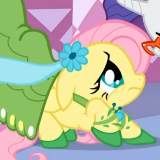Grammer a Week 18: Parenthetical Phrases · 9:46pm Mar 17th, 2016
This is Grammer a Week, the periodic blog program-thing where I soapbox about a grammar subject I find interesting. You might, too! This week's installment is about the parenthetical phrase. Chances are you've used this construction before. You might know it as an aside or an interruption in thought. Past merely defining it, this post will also be about the subtleties of the parenthetical phrase.
Let's get everyone up to speed first. A parenthetical phrase is, strictly speaking, just a non-restrictive clause (that is, one that could be removed from the sentence without a loss of information) that appears in the middle of a sentence.* If you need an example, I gave you two in the last one! "Strictly speaking" and that phrase inside the parentheses.
There are, however, actually three ways to form a parenthetical phrase: with commas, with em dashes, and with parentheses. Each method has a specific use case, and each one conveys a different feel to the sentence.
Commas
Commas are by far the most innocuous punctuation mark, given that they appear everywhere. Use them with parenthetical phrases that are minor interruptions that you don't want to draw too much attention to.
Rainbow wasn't tired, per se, but she did want a nap.
Em Dashes
If commas are the covert operations manager of the parenthetical phrase, then the em dash in the nuclear bomb. Given that they're generally less often used and take up more space, they draw more attention to themselves. Use em dashes to set off a parenthetical phrase if you want to draw attention to it at the expense of the surrounding sentence.
Rarity gingerly stepped on the dirt path—so dusty, it was!—on the way to the schoolhouse.
Note that with parenthetical phrases set off with em dashes, it's acceptable to include exclamation points and question marks within them.
Oh, and if you subscribe to the British English convention, you might make this construction with spaced en dashes ( – ) instead of em dashes (—). Thanks to Loganberry for reminding me.
Parentheses
Parentheses are generally used for situations where you want to provide additional information. As far as "loudness" goes, they're about as disruptive as the em dash.
Twilight went up to her shelf of books (sorted alphabetically, of course), and she picked out her favorite one.
The em dash and parentheses share a lot of use cases, so the decision to use one over the other generally comes down to how formally you want to present yourself. Parentheses are the more formal punctuation, so you'd want to use those in a quarterly report. Em dashes, being more informal, are used more often in stories; parentheses are seen as rather stuffy and clinical in comparison if used excessively.
A note about punctuation—parentheses can be right next to a comma, but an em dash cannot. If you rewrote the above example with em dashes, you would remove the comma after the parentheses entirely—the dash plays double duty.
Parentheses do have one unique use case versus the em dash: while full sentence-like constructions can be flanked by either em dashes or parentheses, clauses in parentheses can optionally stand as their own sentences and be punctuated independently. (Such a construction kind of looks like this, with the terminal punctuation inside the parentheses and none outside.) This also means that while exclamation marks and periods can appear within both parentheses and flanked em dashes, only the parentheses can accommodate the period.
* Strictly speaking, by some definitions, a parenthetical phrase can appear at the beginning or end of a sentence as well, though I just call them introductory phrases and afterthoughts in the respective cases. Since this blog post is only concerned with how the parenthetical phrase interrupts sentences, that's the only definition I will work with. The guidelines I provided get a little messed up if they're used with parenthetical phrases that don't interrupt the sentence.
Thanks for reading! If you have any questions or comments, please post them below. I'm always open to suggestions for future Grammer a Week posts.



I've always found parentheses less "loud" than em dashes, instead of being on the same level. Must be that my eyes find them easier to skim past, or something.
Nice post!
3813232
I'm not sure a single dimension of "loudness" will do to describe the effect.
I'd say that dashes and parentheses both decouple the parenthetical from the host sentence to a greater degree than commas do -- but dashes call attention to the interjection, whereas parentheses will draw attention away from it. In my mind the parentheses say, "this is not important", whereas dashes say, "we interrupt this sentence with an important message".
As it happens, there are more Transatlantic differences here. Yay! :D In British English – which is what I speak – it's common and correct to do what I've just done, ie use en-dashes surrounded by spaces. (I use em-dashes only to mark a break, eg when a speaker is cut off.)
Another one: in BrEng, although "parentheses" is correct it's rather rare outside formal writing. We generally call () "brackets" -- that word alone almost never means [] in everyday BrEng; we call those things "square brackets". As for {}, they're more often "curly brackets" than "braces" over here.